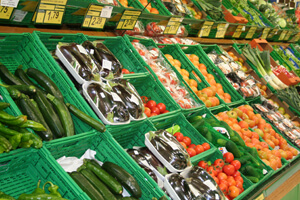
DAVID ADAMS reports…
Rising food prices are causing people to change their diets, according to a global survey released this month.
The survey, carried out on behalf of Oxfam’s GROW campaign, found that a majority of people in most of the 17 countries included in the survey said they were not eating the same food as they did two years ago – before current food price rises began.
|
|
|
Thirty-nine per cent of people who say their diet has changed in the past two years blamed rising food prices for the change. PICTURE: David Lebrero (www.sxc.hu) Our favorite foods:• Australia – Chocolate• Brazil – Lasagne• Germany – Pasta• Ghana – Fufu• Guatemala – Chicken• India – Indian• Kenya – Ugali• Mexico – Mexican• Netherlands – Pasta• Pakistan – Vegetables• Philippines – Chicken• Russia – Meat• South Africa – Pasta• Spain – Paella• Tanzania – Banana and meat• UK – Steak• US – PizzaSource: GlobeScan survey carried out for Oxfam International |
Thirty-nine per cent of all respondents who said their diet had changed blamed the food price rises. Kenya, Mexico, Tanzania, Guatemala, and Spain had the highest proportion of people whose diet has changed citing this as the key reason. Globall, 33 per cent said health reasons were behind their diet change.
The GlobeScan survey also revealed that cost was people’s “biggest food worry” with 66 per cent of people globally citing it as their top concern. Forty-three per cent of people said the healthiness or nutritional value of the food they ate was a key concern while in poorer countries, such as Kenya and Tanzania, the availability of food was also a key concern.
A total of 16,421 people from 17 countries took part in the survey which was conducted online, by phone and face-to-face between 6th April and 6th May this year. Among the countries to take part were Australia, Brazil, Germany, India, the Russia, Tanzania and the US and UK.
The survey was released last week ahead of this week’s meeting of G20 agriculture ministers in .
Andrew Hewitt, Oxfam Australia’s executive director, said he hoped the findings would spark debate about how food is grown and shared.
“Food is one of life’s greatest pleasures and one of our most fundamental human rights but our diets are changing fast and for too many people it is a change for the worst,” he said.
He added that rising food prices were causing people in Australia as well as some of the world’s poorest nations, to cut back on the quality of quantity of food they are consuming.
The survey also found that people living in developing nations were less likely to say they had enough to eat.
Only 26 per cent of people surveyed in Tanzania said they had enough to eat most of the time along with 29 per cent in Kenya and 35 per cent in Ghana. At the other end of the table, 83 per cent of people in the Netherlands and Spain said they had enough to eat most of the time. In Australia the figure was 65 per cent.
Elsewhere, the poll found that oil prices and transportation costs as well as weather patterns (including catastrophic events) were seen as key factors affecting food supply.
Concerns over oil and transportation costs were highest in big food producing nations like the US and South Africa while weather patterns are a particular concern in Australia and Ghana, Tanzania and Kenya.






